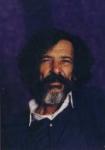Kevin Gilbert (10 July 1933 - 1 April 1993) was born into the Wiradjuri nation on the Kalara riverbank (Lachlan River) in Condobolin, Central New South Wales. During his lifetime, Kevin was a tireless advocate for Aboriginal rights and responsibilities and has left a legacy for others Aboriginal and non-Aboriginal to follow in the struggle for recognition and acceptance of Aboriginal sovereignty and an understanding of the spirituality of the oldest living culture in the world.
The youngest of eight children, Kevin and his siblings became orphaned at a very young age, which exposed the family to the racism of constant police harassment in country towns. He escaped the orphanages and with two of his sisters, returning to Condobolin to their family and extended family where they lived off the land in a 'fringe camp' and holding onto Waradjuri language and culture.
Married with two children, Kevin successfully worked his way to being a station manager on a property near Condoblin, but his marriage ended in a tragedy with the murder of his wife Gomah, aged 23, for which he served over fourteen years in Australia's harshest jails. With limited reading material, and a formal education to fourth grade, Kevin read dictionaries from cover to cover and developed an extensive vocabulary.
In Long Bay Goal, Kevin learnt the art of lino-cutting techniques which enabled him to become the first Aboriginal printmaker. He made his own tools 'from a spoon, fork, gem blades and nails', carved 'old brittle lino off the prison floor' and printed images using the back of a spoon. His artwork was first exhibited in 1970 at the Arts Council gallery, Sydney, in an exhibition organised by the Australia Council.
His creative talents also flourished through poetry, essays and plays. Kevin became the first Aboriginal playwright with The Cherry Pickers written in 1968. In 2001, The Cherry Pickers directed by Wesley Enoch, toured to the Commonwealth Games Cultural Festival in Manchester 2002: Exeter Brighton; Nottingham and Salisbury, England.
In 1971, Kevin joined the Gurindji Lands Rights campaign and was instrumental in establishing the Aboriginal Tent Embassy opposite Parliament House in Canberra in 1972. He crystallised central issues of the Aboriginal political struggle in Because a White Man'll Never Do It and it is recognised as an Angus and Robertson Classic.
He exposed the reality of surviving genocide in the oral history Living Black a collection of Aboriginal people's stories which won the National Book Council award in 1978. In 1979 he spearheaded the National Aboriginal Government protest on Capital Hill, Canberra, calling for acceptance of, and respect for, Aboriginal Sovereignty.
In 1981 he moved to the bush on the Queanbeyan River and co-ordinated the Treaty '88 campaign. He defined a legal argument for justice in Aboriginal Sovereignty, Justice, the Law and Land (including Draft Treaty) and completed the books Inside Black Australia, The Cherry Pickers, and Child's Dreaming.
To coincide with the 1988 opening of the new parliament house Kevin commissioned and exhibited the ground breaking photographic group exhibition Inside Black Australia: Aboriginal Photographers' Exhibition. Later that year, for his anthology Inside Black Australia, the Governor-General presented him the 1988 Human Rights Award for Literature, but Kevin publicly refused it on the grounds that Aboriginal Peoples continue to be denied basic human rights in their own land.
In 1992 Kevin Gilbert was instrumental in re-establishing the Aboriginal Tent Embassy and spent most of the last year of his life at this Tent Embassy. He had a profound conviction that the Aboriginal Embassy is the vehicle through which there will be a resolution to the underlying conflict over the opposing sovereignties in Australia. In the lino-print Colonising Species, with the blood of the oppressed dripping on the Crown, he depicts the turning point for justice as the High Court Mabo decision.
In 1992 he was awarded a four-year Creative Arts Fellowship for his 'outstanding artistic contribution to the nation' but sadly died six months later aged 59. On 8 April 1993 a memorial for Kevin was held at the Aboriginal Tent Embassy, Canberra, where some of his ashes were placed in the fire.
In 1995 Kevin was posthumously presented the RAKA poetry award for Black from the Edge and was highly commended in the ACT Book of the Year award. His autobiographical book for children, Me and Mary Kangaroo, was short listed for the 1995 Australian Multicultural Award.
Kevin is survived by his six children Kevin, Kerry, Kate, Ruth, Euroka and Kalara and many grandchildren and great grandchildren; his second wife of Dutch heritage Cora Gilbert (nee Walther) and English born Eleanor Gilbert (Ellie) (nee Williams) his third wife. (Source: Kerry Reed-Gilbert, 2015.)


